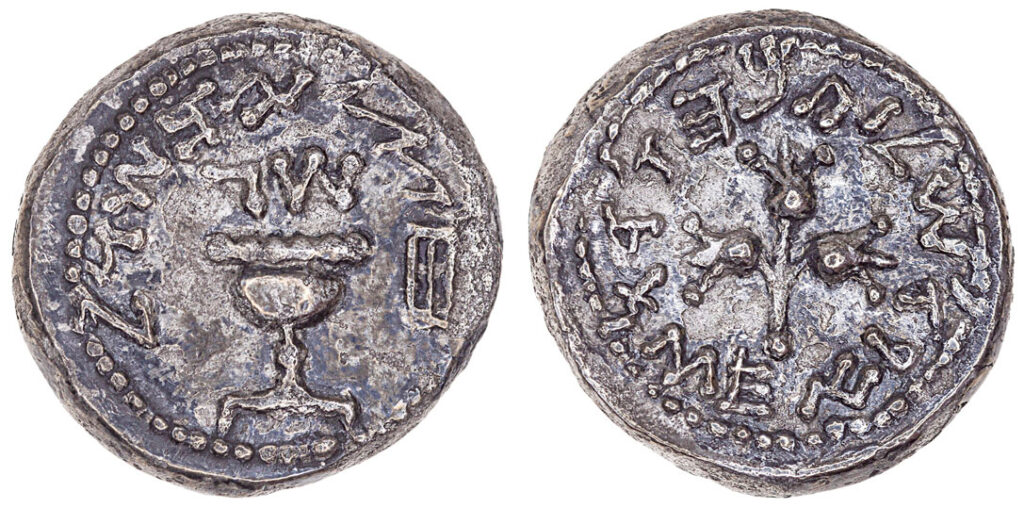THE HALF SHEKEL, PURIM AND ISRAEL’S WAR ON GAZA
RABBI MOSHE TESSONE
DURING THE FIRST PART OF ADAR AND UNTIL EREV PURIM, THERE IS A CUSTOM FOR CONGREGANTS AND COMMUNITY MEMBERS TO CONTRIBUTE A MAHATZIT HA’SHEKEL, WHICH IS HALF A SILVER COIN (OR THE EQUIVALENT VALUE), AS A WAY OF RECALLING THE HALF-SHEKEL THAT WAS DONATED ANNUALLY TO THE SANCTUARY IN THE MONTH OF ADAR. THIS WAS ALSO A MEANS OF COMMEMORATING THE CENSUS THAT WAS TAKEN DURING THE DAYS OF THE BEIT HA’MIKDASH.
The Torah portion dealing with the half-shekel, (Shemot 30:11-16), uses the word terumah (contribution) three times and from there the sages derive that there were three separate gifts of silver (Yerushalmi Shekalim 1:1, Megillah 29B).
Two key questions arise concerning the half shekel custom:
- Why specifically is the word terumah used in this context?
- What is the relevance of this mitzvah to Purim?
The first question is even more perplexing because the Hebrew language has at least three words to describe the giving of charity: the word terumah, the word nedava, and the word tzedakah. And all three words would seem to indicate some type of monetary giving. So, what is unique to the half-shekel that would require specifically the use of the word terumah?

Even though the Hebrew language has these three words to describe the act of charitable giving, each word has a different connotation. Nedava refers to a private or personal gift/donation from one person to another. Terumah refers to a donation from an individual to a communal entity, whereby all in the community take part in that giving and thereby all in the community have a stake in that giving. The word Terumah widens the impact of private giving and turns it into a communal or perhaps even a national project, by having the wider community of givers involved. Tzedakah implies a more “global” giving that not only benefits many simultaneously but also brings humanity and the world closer to achieving justice and restoring peace in a manner that brings the world closer to tikkun olam, which refers to helping restore the world to its original state of perfection.
It is for this reason that precisely the word terumah is used to describe the giving of the mahatzit ha’shekel, since the half shekel is an equal amount given by all in the community to one specific cause, regardless of social or economic status.
This point also speaks to the relevance of the half shekel to Purim, since the half shekel represents the advancement and actualization of communal interdependence, communal unity, and communal equality. It is this sense of communal unity and the merit of achieving such a unity, that saved our ancestors, the Jewish people, from the hands of Haman and King Ahashverosh in ancient Persia.
These lessons of mahatzit hashekel: unity, interdependence, and equality are here for us on the holiday of Purim to inform us of the indispensability of our role in the formation of a Jewish communal entity which we are part of, so that we may realize how much we count and how much each and every one of us are needed. At the same time, we need to recognize our interdependence and how much we need to be connected to others as well to strengthen our nation.
This is the message of the power of mahatzit ha’shekel which gave us the wherewithal to defeat Haman in the times of Ahashverosh, and it will be the source of our power that will give us the strength to defeat the modern-day successors of Haman and of Amalek who tried to destroy our nation throughout the centuries and then once again on October 7, 2023.
The result of the brutal and inhuman attack on Jewish life in Gaza on October 7, was physically and emotionally a devastating blow to our people, beyond compare to anything we have seen since the Holocaust. But it united our people in Israel and all over the world, in a way that will leave an indelible print on our national psyche and on our collective Jewish sense of unity and interdependence.
May it be the will of the Al-Mighty that this year when we contribute the terumah of the half shekel we will be more united as a community and as a nation than we have ever been. The newfound and unflinching unity of the Jewish people will prevail, and guide our victory in this war against evil, as our nation continues to enlighten and guide humanity to a world of morality, spirituality, and peace.
Rabbi Moshe Tessone is a speaker of note in the Jewish world and the Sephardic community at large. He has toured extensively throughout North America, South America, Europe, and Israel as a rabbinic and motivational speaker on Torah-related topics of Jewish and Sephardic interest, Jewish education, history, halakhah, prayer and more.